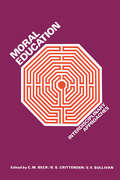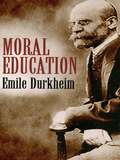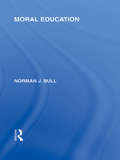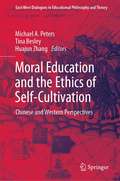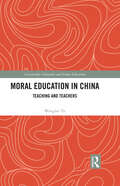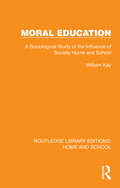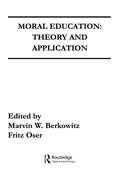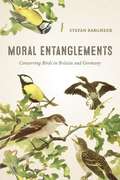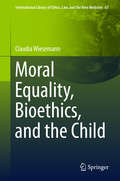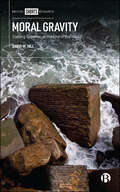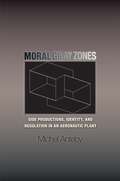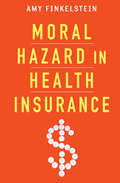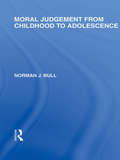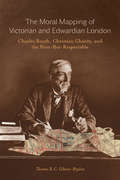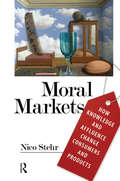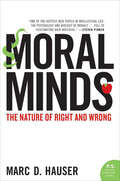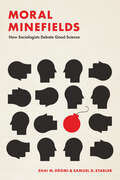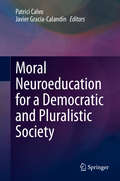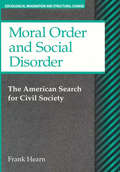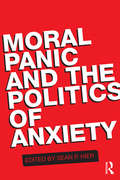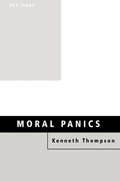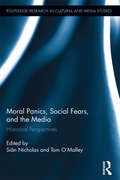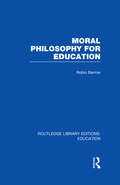- Table View
- List View
Moral Education
by Edmund Sullivan Clive M. Beck Brian S. CrittendenThis volume, based on an interdisciplinary conference of psychologists, sociologists, philosophers, and social scientists, explores a topic of vital importance today---moral education. The book is organized around four questions: the nature and scope of moral education, the problem of ethical pluralism, psychological considerations in a program of moral education, and the social structure of the school as it relates to moral education. This volume will interest philosophers and social scientists concerned with human behaviour and values. It will be of special interest to those engaged in educational research, to curriculum planners, and teachers.
Moral Education
by Émile DurkheimThe great French sociologist and philosopher Emile Durkheim is best known for his classic book Suicide (1897), a landmark in social psychology. Among his other major works is this study in the sociology of education, which features 18 lectures by an influential theorist who discusses his ideas on the school as the appropriate setting for moral education. The first element in developing a moral being, he maintains, is instilling a sense of discipline, followed by a willingness to behave in terms of the group's collective interest, and a sense of autonomy. Durkheim also examines discipline and the psychology of the child, discipline of the school and the use of punishment, altruism in the child, the influence of the school environment, and the teaching of science, aesthetics, and history. Perceptive and provocative, this volume abounds in valuable insights for teachers and others involved in education.
Moral Education (International Library of the Philosophy of Education Volume 4)
by Norman J. BullA companion volume to Moral Judgement from Childhood to Adolescence specially written for teachers and students of education. This volume includes analysis of the broad stages in the developmental pattern; of the key variables that must shape it, and of their function in moral judgement; and of the principles that must lie behind a moral education that has autonomy as its goal. The book concludes with practical proposals for a sequential pattern of moral learning, and the methods of approach appropriate to it.
Moral Education and the Ethics of Self-Cultivation: Chinese and Western Perspectives (East-West Dialogues in Educational Philosophy and Theory)
by Michael A. Peters Huajun Zhang Tina BesleyEducational philosophies of self-cultivation as the cultural foundation and philosophical ethos for education have strong and historically effective traditions stretching back to antiquity in the classical ‘cradle’ civilizations of China and East Asia, India and Pakistan, Greece and Anatolia, focused on the cultural traditions in Confucianism, Taoism, and Buddhism in the East and Hellenistic philosophy in the West. This volume in East-West dialogues in philosophy of education examines both Confucian and Western classical traditions revealing that although each provides its own distinct figure of the virtuous person, they are remarkably similar in their conception and emphasis on moral self-cultivation as a practical answer to how humans become virtuous. The collection also examines self-cultivation in Japanese traditions and also the nature of Michel Foucault’s work in relation to ethical and aesthetic ideals of Hellenistic self-cultivation.
Moral Education in China: Teaching and Teachers (Citizenship, Character and Values Education)
by Wangbei YeThe book presents up-to-date research on moral education teaching and teachers in China. By providing an accessible, practical, yet scholarly source of moral education, education aims and teachers’ ethical roles in China, which is also an international concern, the author systematically reviews Moral Education curriculum, moral education pre-service teacher education, current policies and practices of Moral Education teaching and teachers. The book will be resourceful for researchers, practitioners and policymakers in moral education, citizenship education and teacher education.
Moral Education: A Sociological Study of the Influence of Society, Home and School (Routledge Library Editions: Home and School)
by William KayIn the early 1970s few subjects in schools had grown faster than moral education, and more and more teachers were seeking guidance in a changing and developing field where a training in the ‘traditional’ subjects could not always provide sufficient help. Originally published in 1975, Dr Kay maintained that a study of the sociological factors involved could give considerable insight into the meaning and purpose of moral education, and in this book he examines the effect on the individual pupil of the home, the school and differing socio-economic class structures and ideologies.Using standard sociological analyses Dr Kay discloses some of the determinants of individual morality as they affect children in their homes and schools. He concludes that the alleged moral superiority of the middle-classes merely stresses the fact that the benefits which are currently enjoyed by this minority should become the privilege of all. The analysis of home and school leads him to the view that a democratic milieu is the environment most likely to promote moral growth. And his study of school systems concludes with the view that privileged elitism should be replaced by an ‘aristocracy of service’, with full pupil-participation in every aspect of school life. Today it can be read in its historical context.
Moral Education: Theory and Application (Moral Development And Citizenship Education Ser. #7)
by Marvin W. Berkowitz and Fritz OserFirst published in 1985. Routledge is an imprint of Taylor & Francis, an informa company.
Moral Entanglements: Conserving Birds in Britain and Germany
by Stefan BargheerAt the center of Stefan Bargheer’s account of bird watching, field ornithology, and nature conservation in Britain and Germany stands the question of how values change over time and how individuals develop moral commitments. Using life history data derived from written narratives and oral histories, Moral Entanglements follows the development of conservation from the point in time at which the greatest declines in bird life took place to the current efforts in large-scale biodiversity conservation and environmental policy within the European Union. While often depicted as the outcome of an environmental revolution that has taken place since the 1960s, Bargheer demonstrates to the contrary that the relevant practices and institutions that shape contemporary conservation have evolved gradually since the early nineteenth century. Moral Entanglements further shows that the practices and institutions in which bird conservation is entangled differ between the two countries. In Britain, birds derived their meaning in the context of the game of bird watching as a leisure activity. Here birds are now, as then, the most popular and best protected taxonomic group of wildlife due to their particularly suitable status as toys in a collecting game, turning nature into a playground. In Germany, by contrast, birds were initially part of the world of work. They were protected as useful economic tools, rendering services of ecological pest control in a system of agricultural production modeled after the factory shop floor. Based on this extensive analysis, Bargheer formulates a sociology of morality informed by a pragmatist theory of value.
Moral Equality, Bioethics, and the Child
by Claudia WiesemannPresenting real life cases from clinical practice, this book claims that children can be conceived of as moral equals without ignoring the fact that they still are children and in need of strong family relationships. Drawing upon recent advances in childhood studies and its key feature, the 'agentic child', it uncovers the ideology of adultism which has seeped into much what has been written about childhood ethics. However, this book also critically examines those positions that do accord moral equality to children but on grounds not strong enough to support their claim. It lays the groundwork for a theory of moral equality by assessing the concepts of parenthood, family, best interest, paternalism, and, above all, autonomy and trust which are so important in envisioning what we owe the child. It does not only show how children - like adults - should be considered moral agents from infancy but also how ethical theories addressing adults can significantly profit from recognizing this. The analysis takes into account contributions from European as well as American scholars and makes use of a wide range of ethical, psychological, cultural, and social-scientific research.
Moral Gravity: Staying Together at the End of the World
by David W. HillThinking about climate change can create a paralysing sense of hopelessness. But what about the idea of a planetary exodus? Are high-tech solutions like colonizing other planets just another distraction from taking real action? This radical book unsettles how we think about taking responsibility for environmental catastrophe. Going beyond both hopelessness and false hope in his development of a ‘sociology of the very worst’, David W. Hill debunks the idea of a society that centres around human beings and calls for us to take responsibility for sustaining a coexistence of animals, plants and minerals bound by one planet. We would then find the centre of our moral gravity here together on earth.
Moral Gray Zones: Side Productions, Identity, and Regulation in an Aeronautic Plant
by Michel AntebyAnyone who has been employed by an organization knows not every official workplace regulation must be followed. When management consistently overlooks such breaches, spaces emerge in which both workers and supervisors engage in officially prohibited, yet tolerated practices--gray zones. When discovered, these transgressions often provoke disapproval; when company materials are diverted in the process, these breaches are quickly labeled theft. Yet, why do gray zones persist and why are they unlikely to disappear? In Moral Gray Zones, Michel Anteby shows how these spaces function as regulating mechanisms within workplaces, fashioning workers' identity and self-esteem while allowing management to maintain control.The book provides a unique window into gray zones through its in-depth look at the manufacture and exchange of illegal goods called homers, tolerated in a French aeronautic plant. Homers such as toys for kids, cutlery for the kitchen, or lamps for homes, are made on company time with company materials for a worker's own purpose and use. Anteby relies on observations at retirees' homes, archival data, interviews, and surveys to understand how plant workers and managers make sense of this tacit practice. He argues that when patrolled, gray zones like the production of homers offer workplaces balanced opportunities for supervision as well as expression. Cautioning against the hasty judgment that gray zone practices are simply wrong, Moral Gray Zones contributes to a deeper understanding of the culture, group dynamics, and deviance found in organizations.
Moral Hazard in Health Insurance (Kenneth J. Arrow Lecture Series)
by Amy FinkelsteinMoral hazard—the tendency to change behavior when the cost of that behavior will be borne by others—is a particularly tricky question when considering health care. Kenneth J. Arrow's seminal 1963 paper on this topic (included in this volume) was one of the first to explore the implication of moral hazard for health care, and Amy Finkelstein—recognized as one of the world's foremost experts on the topic—here examines this issue in the context of contemporary American health care policy. Drawing on research from both the original RAND Health Insurance Experiment and her own research, including a 2008 Health Insurance Experiment in Oregon, Finkelstein presents compelling evidence that health insurance does indeed affect medical spending and encourages policy solutions that acknowledge and account for this. The volume also features commentaries and insights from other renowned economists, including an introduction by Joseph P. Newhouse that provides context for the discussion, a commentary from Jonathan Gruber that considers provider-side moral hazard, and reflections from Joseph E. Stiglitz and Kenneth J. Arrow.
Moral Hazard in Health Insurance (Kenneth J. Arrow Lecture Series)
by Amy FinkelsteinAddressing the challenge of covering heath care expenses—while minimizing economic risks. Moral hazard—the tendency to change behavior when the cost of that behavior will be borne by others—is a particularly tricky question when considering health care. Kenneth J. Arrow&’s seminal 1963 paper on this topic (included in this volume) was one of the first to explore the implication of moral hazard for health care, and Amy Finkelstein—recognized as one of the world&’s foremost experts on the topic—here examines this issue in the context of contemporary American health care policy. Drawing on research from both the original RAND Health Insurance Experiment and her own research, including a 2008 Health Insurance Experiment in Oregon, Finkelstein presents compelling evidence that health insurance does indeed affect medical spending and encourages policy solutions that acknowledge and account for this. The volume also features commentaries and insights from other renowned economists, including an introduction by Joseph P. Newhouse that provides context for the discussion, a commentary from Jonathan Gruber that considers provider-side moral hazard, and reflections from Joseph E. Stiglitz and Kenneth J. Arrow. &“Reads like a fireside chat among a group of distinguished, articulate health economists.&” —Choice
Moral Judgement from Childhood to Adolescence (International Library of the Philosophy of Education Volume 5)
by Norman J. BullOriginally published in 1969 this book analyzes the development of moral judgement in children and adolescents. Interviews were held with 360 children aged 7 to 17, with equal numbers of either sex. Original visual devices were planned to elicit judgements in moral areas known to be of universal significance, such as the value of life, cheating, stealing and lying. In addition, analyses of concepts of reciprocity, of the development of conscience and of specificity in moral judgement were derived from the tests. The book inlcudes a critical survey of previous work in this field and places the research in its wider philosophical, psychological and sociological context.
Moral Luck
by Bernard WilliamsMoral Luck centres on questions of moral philosophy and the theory of rational action. That whole area has of course been strikingly reinvigorated over the last decade, and philosophers have both broadened and deepened their concerns in a way that now makes much earlier moral and political philosophy look sterile and trivial.
Moral Mapping of Victorian and Edwardian London: Charles Booth, Christian Charity, and the Poor-but-Respectable
by Thomas R.C. Gibson-BrydonCharles Booth's seventeen-volume series, The Life and Labour of the People in London (1886-1903), is a staple of late Victorian social history and a monumental work of scholarship. Despite these facts, historians have paid little attention to its section on religious influences. Thomas Gibson-Brydon's The Moral Mapping of Victorian and Edwardian London seeks to remedy this neglect. Combing through the interviews Booth and his researchers conducted with 1,800 churchmen and women, Gibson-Brydon not only brings to life a cast of characters - from "Jesusist" vicars to Peckham Rye preachers to women drinkers - but also uncovers a city-wide audit of charitable giving and philanthropic practices. Discussing the philosophy of Booth, the genesis of his Religious Influences Series, and the agents and recipients of London charity, this study is a frank testimony on British moral segregation at the turn of the century. In critiquing the idea of working-class solidarity and community-building traditionally portrayed by many leading social and labour historians, Gibson-Brydon displays a meaner, bleaker reality in London's teeming neighbourhoods. Demonstrating the wealth of untapped information that can be gleaned from Booth's archives, The Moral Mapping of Victorian and Edwardian London raises new questions about working-class communities, cultures, urbanization, and religion at the height of the British Empire.
Moral Markets: How Knowledge and Affluence Change Consumers and Products
by Nico StehrNothing affects modern society more than the decisions made in the marketplace, especially (but not only) the judgments of consumers. Stehr's designation of a new stage in modern societies with the term "moral markets" signals a further development in the social evolution of markets. Market theories still widely in use today emerged in a society that no longer exists. Consumers were hardly in evidence at all in early theories of the market. Today, growing affluence, greater knowledge, and high-speed communication among consumers builds into the marketplace notions of fairness, solidarity, environment, health, and political considerations imbued with a long-term perspective that can disrupt short-term pursuits of the best buy. Importantly, such social goals, individual apprehensions, and modes of consumer conduct become inscribed today in products and services offered in the marketplace, as well as in the rules and regulations that govern market relations. Stehr uses examples to illustrate these trends and build new theory fitting today's changing consumerism.
Moral Minds: The Nature of Right and Wrong
by Marc D. HauserA Harvard scientist illuminates the biological basis for human morality in this groundbreaking book.With the diversity of moral attitudes found across cultures around the globe, it is easy to assume that moral perspectives are socially developed—a matter of nurture rather than nature. But in Moral Minds, Marc Hauser presents compelling evidence to the contrary, and offers a revolutionary new theory: that humans have evolved a universal moral instinct.Hauser argues that certain biologically innate moral principles propel us toward judgments of right and wrong independent of gender, education, and religion. Combining his cutting-edge research with the latest findings in cognitive psychology, linguistics, neuroscience, evolutionary biology, economics, and anthropology, Hauser explores the startling implications of his provocative theory vis-à-vis contemporary bioethics, religion, the law, and our everyday lives.
Moral Minefields: How Sociologists Debate Good Science
by Shai M. Dromi Samuel D. StablerAn analysis of the effects of moral debates on sociological research. Few academic disciplines are as contentious as sociology. Sociologists routinely turn on their peers with fierce criticisms not only of their empirical rigor and theoretical clarity but of their character as well. Yet despite the controversy, scholars manage to engage in thorny debates without being censured. How? In Moral Minefields, Shai M. Dromi and Samuel D. Stabler consider five recent controversial topics in sociology—race and genetics, secularization theory, methodological nationalism, the culture of poverty, and parenting practices—to reveal how moral debates affect the field. Sociologists, they show, tend to respond to moral criticism of scholarly work in one of three ways. While some accept and endorse the criticism, others work out new ways to address these topics that can transcend the criticism, while still others build on the debates to form new, more morally acceptable research. Moral Minefields addresses one of the most prominent questions in contemporary sociological theory: how can sociology contribute to the development of a virtuous society? Rather than suggesting that sociologists adopt a clear paradigm that can guide their research toward neatly defined moral aims, Dromi and Stabler argue that sociologists already largely possess and employ the repertoires to address questions of moral virtue in their research. The conversation thus is moved away from attempts to theorize the moral goods sociologists should support and toward questions about how sociologists manage the plurality of moral positions that present themselves in their studies. Moral diversity within sociology, they show, fosters disciplinary progress.
Moral Neuroeducation for a Democratic and Pluralistic Society
by Patrici Calvo Javier Gracia-CalandínThis book brings together a group of top scholars on ethics and moral neuroeducation to cover the specific field of moral learning. Although there are many studies on neural bases of human learning and the application processes in different fields of human activity, such as education, economics or politics, very few of them have delved into the specific field of moral learning. This book brings forward a discursive and cordial ethical concept suitable for the theoretical-practical development of moral neuroeducation, as well as a set of guidelines for the design of an educational model that, based on moral neuroeducation, contributes to the resolution of social problems and the eradication of undesirable patterns and behaviors such as hate speech, corruption, intolerance, nepotism, aporophobia or xenophobia. Furthermore it contains a management approach for the application of this educational model to the different areas of activity involved in social and human development. A must read for students, educators and researchers in the field of moral philosophy, (applied) ethics ethics and any other discipline working with reciprocity (economics, politics, health, etc.).
Moral Order and Social Disorder: American Search for Civil Society (Sociological Imagination And Structural Change Ser.)
by Frank HearnDrawing upon both classical insights and more recent writings, Hearn provides a compelling account of social breakdown in the United States. The book examines the conditions most responsible for the deterioration of social institutions, notably the family, and of communitarian interdependencies, such as those that support neighborhoods. More specifically, Hearn analyzes the defining forces of liberal modernity--among them, especially, the market economy (favored by the political right) and the democratic welfare state (endorsed by the political left)--whose steady expansion has diminished the social contexts that nurture trust, mutuality, and a robust sense of both personal responsibility and social obligation. The originality of Hearn's book lies in the solutions he proposes, which differ from those rooted in what Hearn calls ""the languages of modernity."" Hearn advocates modes that would serve instead to renew solidarity and reclaim social virtue, a repertory of strategies that would answer Emile Durkheim's call for the creation of moral individualism. He assesses various approaches to revitalizing the social settings, the social institutions, and communitarian structures within which people become moral individuals capable of care about and taking responsibility for the fates of others. Readers of this book are invited to draw their own conclusions by relying in larger part on themselves as parents, neighbors, community members, and citizen-participants in a civil society in restoration. As the American Journal of Sociology notes, ""the book succeeds in its goals, and it deserves to be widely read.""Frank Hearn was professor of sociology at the State University of New York, College of Cortland, and the author of Reason and Freedom in Sociological Thought and The Transformation of Industrial Organization.
Moral Panic and the Politics of Anxiety
by Sean P. HierMoral Panic and the Politics of Anxiety is a collection of original essays written by some of the world’s leading social scientists. It seeks to provide unique insight into the importance of moral panic as a routine feature of everyday life, whilst also developing an integrated framework for moral panic research by widening the scope of scholarship in the area. Many of the key twenty-first century contributions to moral panic theory have moved beyond the parameters of the sociology of deviance to consider the importance of moral panic for identity formation, national security, industrial risk, and character formation. Reflecting this growth, the book brings together recognized moral panic researchers with prominent scholars in moral regulation, social problems, cultural fear, and health risks, allowing for a more careful and critical discussion around the cultural and political significance of moral panic to emerge. This book will prove valuable reading for both undergraduate and postgraduate students on courses such as politics and the media, regulatory policy, the body and identity, theory and political sociology, and sociology of culture.
Moral Panics (Key Ideas)
by Kenneth ThompsonIt is widely acknowledged that this is the age of moral panics. From the Bulger case to mad cow disease, newspaper headlines continually warn of some new danger and television programmes echo the theme with sensational docmenturies.This concise survey will help student trace the development of ideas of moral panic and to analyse how changing public perceptions are shaped and reflected through the media over time. Using examples drawn from:* club culture and raves* mugging* sex and AIDS* children, violence and the family.
Moral Panics, Social Fears, and the Media: Historical Perspectives (Routledge Research in Cultural and Media Studies)
by Siân Nicholas Tom O’MalleyThe media have always played a central role in organising the way ideas flow through societies. But what happens when those ideas are disruptive to normal social relations? Bringing together work by scholars in history, media and cultural studies and sociology, this collection explores this role in more depth and with more attention paid to the complexities behind conventional analyses. Attention is paid to morality and regulation; empire and film; the role of women; authoritarianism; wartime and fears of treachery; and fears of cultural contamination. The book begins with essays that contextualise the theoretical and historiographical issues of the relationship between social fears, moral panics and the media. The second section provides case studies which illustrate the ways in which the media has participated in, or been seen as the source of, the creation of threats to society. Finally, the third section then shows how historical research calls into question simple assumptions about the relationship between the media and social disruption.
Moral Philosophy for Education (Routledge Library Editions: Education)
by Robin BarrowTeachers and students are frequently confused as to the relevance of abstract philosophical theorising to the reality of the classroom and this book is distinctive for the attention it devotes to philosophy and its potential contribution to practical matters, and education in particular. The author is critical of many current views of the philosophy of education and argues the validity of philosophy as an integral part of education in its own right, against the creation of a ‘new’ branch of philosophy, the ‘philosophy of education’. The book stresses that relativist ethical theories are no more ‘known’ to be valid than the absolutist theories they have replaced, and in the second section the author argues for a modified utilitarian position. The final section enables the reader to relate the general argument of the second part to several specific issues.
